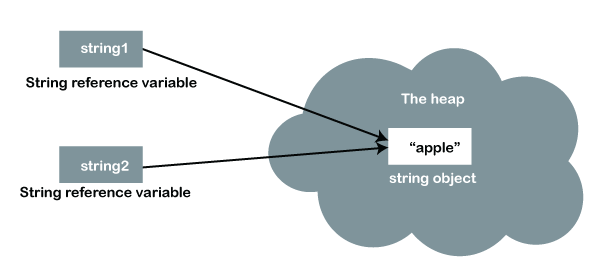Why Are Strings Immutable in Java? Comprehending the Core Principles
Why Are Strings Immutable in Java? Comprehending the Core Principles
Blog Article
What Is Immutable Strings and Exactly How It Works
In the world of programming, recognizing the principle of immutable strings is extremely important for developing secure and robust applications. Unalterable strings refer to strings that can not be changed after they are produced, making certain data stability and predictability within the code. This essential principle plays a vital function in different programming languages and provides a special strategy to managing information. By checking out the ins and outs of just how unalterable strings work, one can discover a world of advantages and possibilities that can elevate the quality and efficiency of software program development.
The Basics of Unalterable Strings
Immutable strings, as a fundamental idea in programming, are character sequences that can not be changed as soon as they are created. This means that once a string is assigned a value, that worth can not be altered. In languages like Python and Java, strings are unalterable objects, bring about different effects in regards to memory administration and data honesty.
Among the key advantages of unalterable strings is that they supply a sense of protection in data adjustment. Given that the material of an immutable string can not be changed, it makes certain that the original data continues to be intact, lowering the threat of unintended adjustments throughout program implementation (Why are strings immutable in Java?). This property likewise simplifies debugging processes, as designers can rely on that once a string is defined, its worth will certainly not be unintentionally changed
Additionally, unalterable strings facilitate reliable memory usage. When a new string is created based upon an existing one, instead of customizing the initial string, the new value is stored individually. This technique boosts efficiency by decreasing memory fragmentation and simplifying memory allotment processes. On the whole, recognizing the essentials of unalterable strings is critical for grasping programming principles and optimizing code effectiveness.
Advantages of Immutable Strings
Structure upon the safety and performance benefits of unalterable strings, their advantages encompass improving code reliability and simplifying simultaneous shows jobs. By being unalterable, strings can not be modified after development, which gets rid of the risk of unplanned modifications in the information they store. This inherent immutability makes sure that as soon as a string is created, its worth continues to be constant throughout the program's implementation, reducing the opportunities of bugs brought on by unexpected modifications.
Furthermore, unalterable strings add to code reliability by making it easier to reason about the state of a program. Considering that strings can not be altered, programmers can rely on that a string will certainly always hold the same value, simplifying debugging and upkeep efforts. This predictability brings about much more reliable and steady codebases.

Application in Programming Languages
Within numerous programming languages, the unification of immutable strings is Extra resources an essential element that impacts how information is taken care of and controlled within code frameworks. The application of unalterable strings varies across various programming languages, with each language supplying its own mechanisms to sustain this concept.

On the other hand, languages like C and C++ do not have built-in support for immutable strings. Programmers in these languages must manually execute immutability by imposing regulations within their code to avoid direct adjustments to string items.
Ideal Practices for Functioning With Unalterable Strings
When handling unalterable strings in programming languages like Java and Python, sticking to best practices ensures effective and protected data adjustment. Among the essential best methods is to use StringBuilder or StringBuffer rather than straight controling strings, specifically when handling comprehensive concatenation procedures. These classes supply mutable alternatives for string control, helping to prevent unnecessary memory appropriations and improving efficiency.
Furthermore, when functioning with delicate information such as passwords or API secrets, it is crucial to avoid saving them as plain text in immutable strings. Making use of safe storage devices like char varieties or specialized libraries for dealing with delicate details aids mitigate safety and security risks associated with immutable strings.
Real-world Applications and Examples
Checking out sensible executions of unalterable strings in various sectors discloses their significant impact on information stability and system dependability. In the health care industry, unalterable strings play an important role in guaranteeing the safety and security and privacy of person information. By protecting against unapproved modifications to delicate information such as clinical documents and prescriptions, immutable strings help maintain conformity with stringent personal privacy policies like HIPAA.
Banks likewise take advantage of the unalterable nature of strings to enhance the security of client data and purchase documents. Immutable strings assist protect against fraudulence and unapproved modifications to economic info, offering a robust protection against cyber hazards and making sure the trust and self-confidence of customers.

Conclusion
To conclude, immutable strings are repaired and unchangeable series of characters that use benefits such as string safety and security and boosted efficiency in programming. They are applied in various programming languages to guarantee information stability and protection. Best methods for dealing with unalterable strings include staying clear of straight alterations and utilizing approaches that return go to these guys new string objects. Real-world applications of immutable strings include data file encryption, caching, and string adjustment jobs.
Immutable strings refer to strings that can not be modified after they are produced, making sure data honesty and predictability within the code. When a new string is developed based on an existing one, instead than changing the original string, the brand-new value is saved individually.In languages like Java and Python, strings are unalterable by default, suggesting that as soon as a string object is developed, its worth can not be changed - Why are strings immutable in Java?. Best techniques for working with unalterable strings consist of avoiding straight alterations and utilizing approaches that return brand-new string items. Real-world applications of unalterable strings include data encryption, caching, and string adjustment jobs
Report this page